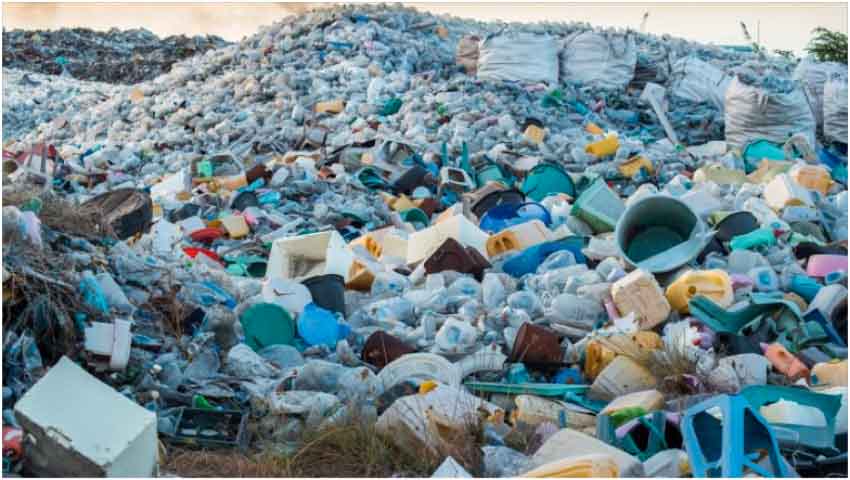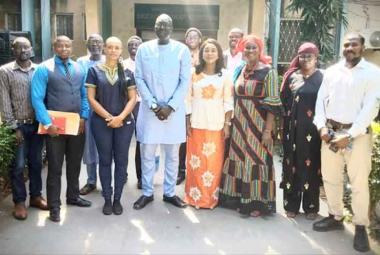By Awa Sowe
The Ghanaian Minister of Environment, Science, Technology and Innovation, Hon. Ophelia Mensah Hayford has disclosed that global plastic production has grown by over 399 million metric tons from 1950 to 2017.
He made the disclosure during the Joint Committee of the ECOWAS Parliament on Environment in Winneba Ghana, under the theme: “Plastic Waste Management: Challenges and Prospects in Implementing a Community Policy.”
He said the environmental, economic and health impacts of plastic pollution are well- documented, stressing that it is imperative that they take decisive action to mitigate these effects. He informed that as estimated, global plastic production could triple by 2050, with only 9% of the 9 billion tons of plastics ever produced, recycled, and with 8 to 12 million tons entering the ocean as litter every year.
Hon. Hayford said that the Pew Charitable Foundation estimates the volume of plastics finding its way into the world’s Oceans will triple by 2040. In Africa, he said, less than 20 percent of plastics are currently recycled and this is far below European Union target of 50 percent by 2025. He said in lieu of formal recycling operations, waste collectors collect litter and sell it to middlemen who aggregate plastic waste and sell it to recyclers abroad.
“Available data indicates that Ghana is generating close to 1 million metric tons of plastic waste annually, with less than 10% being recycled and 9% leaking into the Ocean. Over the years, from 1992 through 2008 to 2019, plastic waste composition within domestic waste has risen from 0.7% to 2.8% to 17%,” he said.
He said some experts believe the solution lies in creating circular economies which eliminates single-use plastic in favor of organic materials, or plastics that can be recycled and reused. He said plastic waste management presents a complex challenge that requires a multi-faceted approach, because it involves not only the reduction of plastic waste generation, but also the enhancement of recycling and disposal methods.
He commended the ECOWAS Parliament for their proactive stance and commitment to develop comprehensive policies to address these critical issues.
At the international level, Hon. Hayford said Ghana is actively contributing to conversations and processes aimed at developing an international legally binding instrument for plastic pollution, and said this includes the marine environment also known as the Global Plastics Treaty (GPT) and the African Ministerial Conference on the Environment (AMCEN) in their decision, established the African Group of Negotiators (AGN) on plastics pollution and appointed Ghana as Chair. He added that additionally, Ghana submitted a proposal known as the Global Plastic Pollution Fee (GPPF) as one of the means of financing the implementation of the instrument. And this he said has been fully captured in the revised draft text of the international legally binding instrument on plastic pollution, including the marine environment. He said the engagements on this proposal are ongoing and will continue during inter-sessional work under the Expert Working Group’s (EWGs) discussion on issues around the financing mechanism, among other components of the means of implementation of the treaty. He said Ghana’s success story in plastic waste management is notable thanks to several innovative initiatives and collaborative efforts between the government, the private sector, academia and communities.
Some of these efforts he said, include policy and regulation, and said the government of Ghana through MESTI and with support from stakeholders in 2019, developed the National plastic waste management policy which received cabinet approval in 2020, and will harmonize exiting policies and programs on plastics for sustainable development.
On public-private partnerships, Hon. Hayford said collaboration between the government and the private sector has been crucial, adding that several companies are leading the charge by converting plastic waste into useful products.
The Speaker of the ECOWAS Parliament, Hon. Hadja Mémounatou Ibrahima, elaborated on how the negative impacts plastic waste pollution can have on regional food security and public health of communities, and the break it can cause in the economic development of the ECOWAS Region.
Speaker Ibrahim said the menace of plastic waste in the region can be blamed on the lack of adequate infrastructure to collect, sort out and process plastic waste. She identified the lack of awareness among the people as one of the factors and warned that plastic waste pollution may have a significant impact on food security within the region. According to her, despite the efforts made at different levels by the authorities to combat the situation, ECOWAS “is still struggling to eradicate plastic waste from towns, the countryside and from the Oceans.’’
She said the scourge is an environmental threat and a brake on the economic development of the region. She added that the impact of plastic pollution on public health is also a cause for concern, with the increased risks of illness linked to pollution and contamination of water resources.
Speaker Ibrahim continued that at an international level, awareness of the many negative impacts of plastic waste on the environment and human and animal health has led the international community to institute a “World Plastic Bag Free Day” in 2010, which is celebrated every 3rd July. She stated that ECOWAS is aware of the urgency of the situation and has adopted a community policy for the management of plastic waste.
“This ambitious and necessary policy aims to promote the reduction, recycling, and recovery of plastic waste while ensuring the responsible management of non-recyclable waste,” she said.
She pointed out that at the national level, certain Member States like Togo, Mali, Côte d’Ivoire, Burkina Faso, Guinea-Bissau, Niger, Gambia and Senegal have already adopted legislation to regulate the plastics sector, to effectively combat plastic pollution. She maintained that ECOWAS has also adopted a regulation on plastic products and the harmonization of environmentally sound management of plastic waste in ECOWAS member states. She said this will alleviate the difficulties experienced by member states in the effective implementation of the regulations already in place.
While describing West Africa as the cradle of vibrant cultures and exceptional natural resources, she expressed concern that the sub-region is confronted by a significant environmental challenge that threatens development and the collective well-being of the people through the proliferation of plastic waste.
“The impact of plastic pollution on our ecosystem is undeniable and poses a significant threat to our survival with alarming figures. ECOWAS generates around 17 million tons of plastic waste annually of which only 10 percent is recycled,” she said; stressing that the lack of proper management leads to an accumulation of plastic waste in the environment which in turn pollutes the oceans, rivers, and soils, threatening biodiversity, and said individual efforts are not enough. She said collective action and collaboration are needed to propose effective solutions for plastic waste management in the face of these challenges and to think deeply about innovative and sustainable solutions to this problem.
“The fight against plastic pollution is a shared one. It concerns environmental issues, social justice, and sustainable development. By joining forces, sharing experiences, and exploring innovative solutions, we can meet this challenge and build a more sustainable future for our region,” Speaker Ibrahim concludes.
In The Gambia, the National Environment Agency’s mandate is to ensure an environmentally sustainable economic and social development in The Gambia under the NEMA, 1994. It is empowered to take direct implementation action in matters dealing with environment; especially in establishing environmental quality and monitoring standards, In the area of environmental quality exclusively taking into account pollution control.
Mrs Mariatou Dumbuya, Senior Programme Officer Environment Quality at the National Environment Agency (NEA) said that the agency held series of sensitisation on both radio and television to inform the public on the anti -littering laws and the effects of plastic pollution
She added that littering is not only a public nuisance, but that there are many other negative environmental impacts as well. She warned that plastic pollution can harbor disease vectors such as rats, mosquitoes, flies or cockroaches. With such vectors diseases are easily spread to the wider population,
In conclusion she urged everyone to participate as environmental issues requires multi -faceted approaches for positive outputs, with attitudinal change in ensuring a clean and health environment for all.







